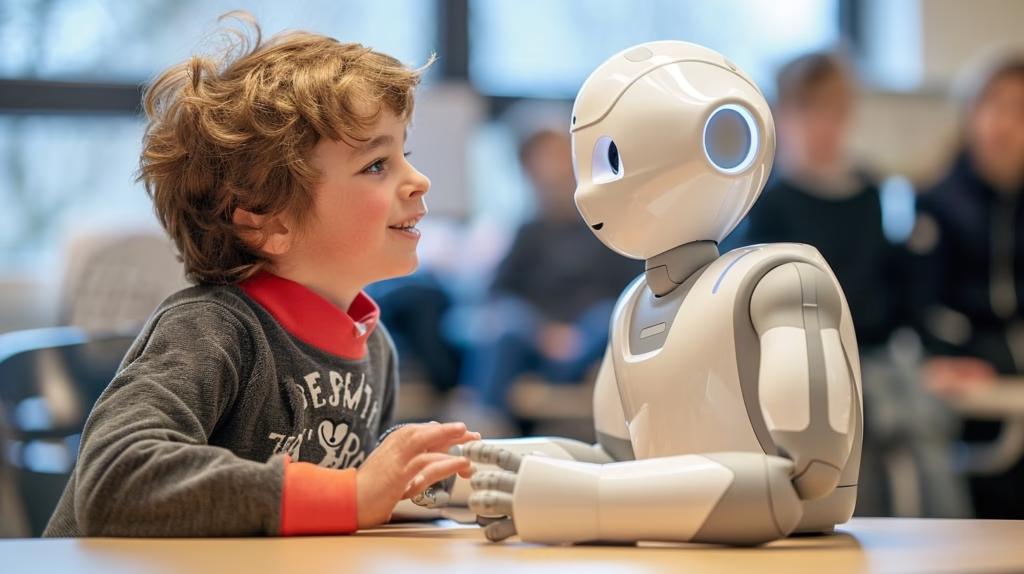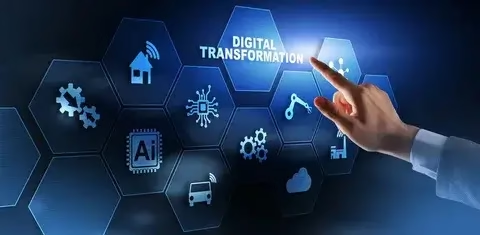
How AI technology is shaping the future of education is present process a seismic transformation, and at its center lays Artificial Intelligence (AI). With its unheard of ability to conform, study, and innovate, AI technology isn’t handiest redefining conventional coaching techniques but additionally revolutionizing the manner students engage with information. From customized learning to administrative automation, AI’s integration is reshaping lecture rooms, making them smarter, extra efficient, and inclusive.
Integrating AI Influencers in Education
As how AI technology is shaping the future of education, a fascinating concept is emerging: AI influencers in learning environments. Imagine a virtual mentor powered by AI that engages students like a trusted guide—answering questions, providing feedback, and even inspiring them to explore new topics. These AI influencers can be tailored to specific educational goals, making learning more relatable and exciting. By combining the personal touch of an influencer with the intelligence of AI, schools and online platforms can create interactive learning experiences that feel both engaging and supportive. This innovation bridges technology with human connection, fostering curiosity and making education more accessible for everyone.
In this in-depth exploration, we will discuss how AI technology is shaping the future of education, delve into the position of technology in this alteration, and analyze its capability challenges and possibilities.
1. How Technology is Changing Education
The educational landscape has continually developed with improvements in generation. From overhead projectors to smartboards, every innovation has aimed to decorate training and gaining knowledge of. However, the emergence of AI-powered tools is proving to be an actual recreation-changer.
Key Advancements in Education Technology:
- AI-Powered Learning Platforms: Tools like DreamBox and Knewton customize the learning experience for individual students.
- Digital Classrooms: Applications like Google Classroom streamline collaboration and remote learning.
- Real-Time Feedback Systems: AI analyzes student conduct and affords instantaneous interventions to bridge understanding gaps.
By automating mundane tasks and delivering personalized content, era is transforming education, making it more available and impactful than ever earlier than.
2. How Will Technology Change Education in the Future?
The future of training is a blend of AI innovations and rising computing technology. These advancements promise to revolutionize how college students analyze and the how they educators teach.
Key Predictions:
- Hyper-Personalized Learning: AI will allow training to be tailor-made exactly to a scholar’s tempo, possibilities, and demanding situations.
- Lifelong Learning Opportunities: Platforms will permit individuals of all ages to continuously upskill and reskill.
- Immersive Experiences: Virtual Reality (VR) and Augmented Reality (AR) will transport college students to virtual labs, historical landmarks, or maybe the cosmos.
For example, believe a records magnificence wherein students truly explore historical Egypt through immersive AR or a biology lesson wherein they interact with 3D fashions of human anatomy.
3. The Role of Technology in Shaping the Future: An Overview
Technology’s function in education goes past innovation; it basically reshapes the gaining knowledge of experience, making it greater inclusive and collaborative.
Core Benefits of Technology:
- Global Accessibility: Platforms like Coursera and edX offer high-quality training to novices across the globe.
- Enhanced Collaboration: Tools like Slack and Padlet inspire teamwork and peer-to-peer learning.
- Administrative Efficiency: Automated tools lessen teacher workloads, permitting them to recognition greater on personalized pupil interactions.
By integrating such equipment, the educational atmosphere can better put together beginners for a tech-driven world.
4. How Technology is Shaping the Future of Education with AI Technology
Discussions on platforms like Quora and academic forums emphasize the profound impact of how AI technology is shaping the future of education. These insights often highlight how AI not only personalizes learning but also streamlines operations within educational institutions.
Major Trends Observed:
- AI-Powered Tutors: Tools like Cognii and CheggMate provide step-by-step guidance to students.
- Gamified Learning: Applications such as Duolingo engage college students with interactive, recreation-like instructions.
- Real-Time Analytics: AI tracks pupil progress, assisting educators make informed selections on lesson plans and teaching strategies.
This shift marks a collaborative era where AI and educators work together to create more enriching learning environments.
5. The Role of Technology in Shaping the Future of Education Speech
When preparing a speech on how AI technology is shaping the future of education, focus on the collaboration between educators and advanced tools. Highlight the transformative potential of AI while emphasizing its role as an enabler rather than a replacement.
Speech Outline:
- Introduction: Share an anecdote about how personalized AI tools have helped a struggling student excel.
- Key Highlights:
- AI automates repetitive tasks, freeing teachers for meaningful engagement.
- Personalized learning ensures no student is left behind.
- Call to Action: Stress the importance of ethical AI integration to ensure equity in education.
Speeches like this inspire audiences to embrace technology while being mindful of its ethical implications.
6. New Technology for Students
Emerging tools are revolutionizing education for modern learners. From AI-driven learning systems to adaptive platforms, students now have access to a suite of technologies designed to enhance their educational journey.
Notable Innovations:
- Smart Textbooks: Embedded with features like summaries and practice questions, these books make studying interactive.
- Assistive Technologies: Tools like Dragon Speech Recognition ensure inclusivity for differently-abled students.
- Gamified Apps: Platforms like Quizlet boost engagement with flashcards and interactive games.
These technologies empower students to take control of their learning, fostering independence and curiosity.
7. Computing Innovations for Future Schools
Future schools will heavily depend upon computing improvements to create adaptive and responsive mastering environments. AI and the Internet of Things (IoT) will play pivotal roles in those alterations.
What to Expect:
- Smart Classrooms: IoT devices will monitor student engagement and adjust environmental factors like lighting for optimal learning conditions.
- Cloud-Based Platforms: Services like Zoom and Microsoft Teams will make learning accessible from anywhere.
- Advanced Analytics: Real-time information will help teachers recognize student development and refine their teaching methods.
These innovations will prepare students for a destiny where adaptability and virtual literacy are paramount.
8. Ethical Considerations in AI-Powered Education
With AI’s increasing presence in training, addressing moral concerns is essential. Data privacy and equitable get right of entry are two large challenges that should be navigated responsibly.
How to Tackle These Challenges:
- Data Security: Ensure compliance with guidelines like GDPR to defend touchy student statistics.
- Equitable Access: Governments and establishments should put money into infrastructure to provide identical access to AI-powered gear..
Balancing innovation with duty ensures that technology advantages all beginners, regardless of their background.
9. Preparing Students for an AI-Driven Future
In an international more and more shaped by AI, college students need to expand the abilities to navigate and leverage those technology. Schools should focus on coaching AI literacy alongside conventional topics.
Key Skills to Foster:
- Understanding AI Systems: Platforms like Code.org introduce college students to coding and device studying basics.
- Critical Thinking: Encouraging trouble-solving and analytical talents prepares college students for complicated, tech-pushed scenarios.
- Ethical Awareness: Teaching college students approximately the societal implications of AI fosters responsible innovation.
By embedding the ones competencies into curricula, we will make certain students are geared up for the challenges and opportunities of the future.
Conclusion
How AI technology is shaping the future of education isn’t just a query of innovation—it’s a reimagining of what training may be. From personalized getting to know and gamified platforms to advanced analytics and assistive equipment, AI is revolutionizing school rooms globally. However, the ethical challenges of facts privateness and equitable get right of entry to ought to be addressed to ensure nobody is left in the back of.
The future of training lies within the partnership among people and machines. Teachers, empowered via AI, will maintain to play a relevant function in nurturing creativity, empathy, and crucial wondering—traits that no set of rules can mirror. Together, we will create a better, greater inclusive and equitable academic machine.


